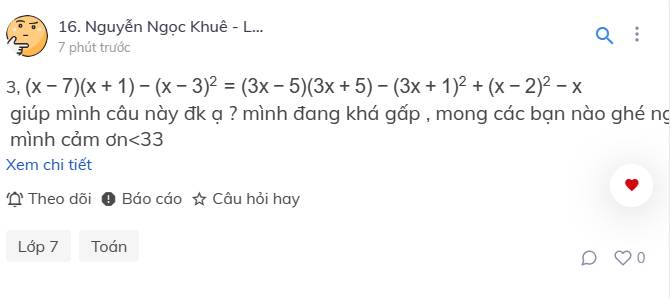Hãy nhập câu hỏi của bạn vào đây, nếu là tài khoản VIP, bạn sẽ được ưu tiên trả lời.


\(C=\dfrac{1}{2}.\dfrac{2}{3}.\dfrac{3}{4}.....\dfrac{48}{49}.\dfrac{49}{50}=\dfrac{1}{50}\)

\(\dfrac{x+2}{x-2}-\dfrac{2}{x^2-2x}=\dfrac{1}{x}\left(đk:x\ne0,x\ne2\right)\)
\(\Leftrightarrow\dfrac{\left(x+2\right)x-2}{x\left(x-2\right)}=\dfrac{x^2-2x}{x\left(x-2\right)}\)
\(\Leftrightarrow x^2+2x-2=x^2-2x\)
\(\Leftrightarrow4x=2\Leftrightarrow x=\dfrac{1}{2}\)
Cho mình sửa lại nhé:
\(\dfrac{x+2}{x-2}-\dfrac{2}{x^2-2x}=\dfrac{1}{x}\left(đk:x\ne0,x\ne2\right)\)
\(\Leftrightarrow\dfrac{\left(x+2\right)x-2}{x\left(x-2\right)}=\dfrac{x-2}{x\left(x-2\right)}\)
\(\Leftrightarrow x^2+2x-2=x-2\)
\(\Leftrightarrow x^2+x=0\)
\(\Leftrightarrow x\left(x+1\right)=0\)
\(\Leftrightarrow\left[{}\begin{matrix}x=0\left(ktm\right)\\x=-1\left(tm\right)\end{matrix}\right.\)

Đề ko rõ ràng \(\sqrt{x^2}+x+\dfrac{1}{4}\) hay \(\sqrt{x^2+x+\dfrac{1}{4}}\)??

Lời giải:
$\frac{1}{x}+\frac{1}{y}+\frac{2}{x+y}=\frac{x+y}{xy}+\frac{2}{x+y}$
$=x+y+\frac{2}{x+y}$
$=\frac{x+y}{2}+\frac{x+y}{2}+\frac{2}{x+y}$
$\geq \frac{x+y}{2}+2\sqrt{\frac{x+y}{2}.\frac{2}{x+y}}$ (áp dụng BDT Cô-si)
$\geq \frac{2\sqrt{xy}}{2}+2=\frac{2}{2}+2=3$
Vậy ta có đpcm
Dấu "=" xảy ra khi $x=y=1$


Đề trước đó:

(x-7)(x+1)-(x-3)^2=(3x-5)(3x+5)-(3x+1)^2+(x-2)^2-x
<=>x^2+x-7x-7-x^2+6x-9=9x^2-25-9x^2-6x-1+x^2-4x+4-x
<=>x^2-11x-6=0
<=>x^2-2x. 11/2 + 121/4-145/4=0
<=>(x-11/2)^2=145/4
<=>|x-11/2|=căn(145)/2
<=>x=[11+-căn(145)]/2

có [x-y]2=1
suy ra [x-y]mũ 2= 1 mũ 2
suy ra x-1=1
x=1+1
x=2

`(x+3)(x^2-5x+8)=(x+3).x^2`
`<=>(x+3)(x^2-5x+8-x^2)=0`
`<=>(x+3)(8-5x)=0`
`<=>` \(\left[ \begin{array}{l}x+3=0\\8-5x=0\end{array} \right.\)
`<=>` \(\left[ \begin{array}{l}x=\dfrac85\\x=-3\end{array} \right.\)
Vậy `S={-3,8/5}`
`(x+3)(x^2-5x+8)=(x+3).x^2`
`<=>(x+3)(x^2-5x+8-x^2)=0`
`<=>(x+3)(-5x+8)=0`
\(\Leftrightarrow\left[{}\begin{matrix}x+3=0\\-5x+8=0\end{matrix}\right.\\ \Leftrightarrow\left[{}\begin{matrix}x=-3\\x=\dfrac{8}{5}\end{matrix}\right.\)
Vậy `S={-3;8/5}`.

\(\dfrac{x}{9}< \dfrac{4}{7}< \dfrac{x+1}{9}\)
=>\(\dfrac{7x}{63}< \dfrac{36}{63}< \dfrac{7x+7}{63}\)
\(\Rightarrow7x< 36< 7x+7\)
\(\Rightarrow x< \dfrac{36}{7}< x+1\)
\(\Rightarrow x< 5\dfrac{1}{7}< x+1\)
\(\Rightarrow x=5\)
ĐKXĐ: \(x\notin\left\{1;-1\right\}\)
Ta có: \(\dfrac{x-3}{x+1}=\dfrac{x^2}{x^2-1}\)
\(\Leftrightarrow\dfrac{\left(x-3\right)\left(x-1\right)}{\left(x+1\right)\left(x-1\right)}=\dfrac{x^2}{\left(x-1\right)\left(x+1\right)}\)
Suy ra: \(x^2-4x+3-x^2=0\)
\(\Leftrightarrow-4x=-3\)
hay \(x=\dfrac{3}{4}\)(thỏa ĐK)
Vậy: \(S=\left\{\dfrac{3}{4}\right\}\)